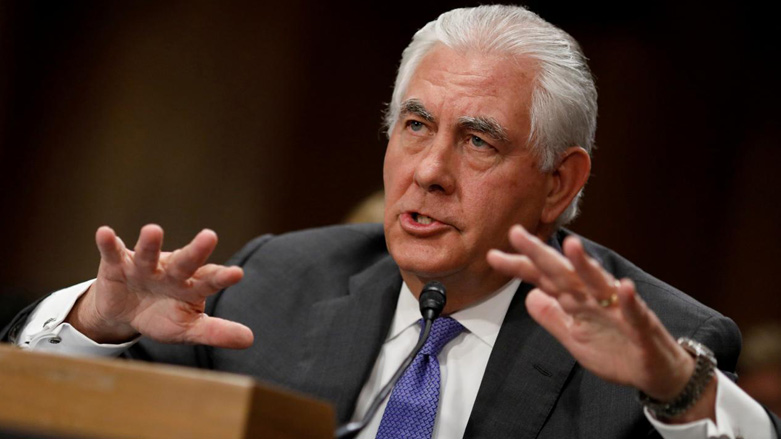Rex Tillerson explains US Middle East policy

WASHINGTON DC, United States (Kurdistan 24) – US Secretary of State Rex Tillerson provided reporters on Tuesday with “a walk around the world,” as he sees it. Understanding his perspective is, of course, essential for understanding the Trump administration’s foreign policy.
Iran still poses significant dangers, in Tillerson’s view. The nuclear agreement (formally known as the Joint Comprehensive Plan of Action or JCPOA), deals only “with a very small slice” of the threats from Iran, he said.
In the agreement, Iran secured significant gains up front “with the release of a lot of cash,” as well as the “immediate lifting” of sanctions, before it had to deliver on anything. That has left the US with limited leverage to enforce the agreement going forward, according to Tillerson.
One “unfortunate” consequence of the narrowly focused effort to conclude the agreement was to ignore all of Iran's other “destabilizing activities in the region,” he noted. That includes Iran’s “ongoing ballistic missile programs,” and its export of terrorism, “of instability in Yemen” and of “foreign fighters into Iraq and Syria.”
Brig. Gen Ernie Audino (USA, Ret.) told a Capitol Hill conference, co-sponsored by Kurdistan24, on Friday that Tehran has some 110,000 militia men inside Iraq.
In discussing Syria, Tillerson explained that the US was working with Russia to restore “stability” in a “unified” country.
However, the US has two key conditions that must be met in any resolution of Syria’s conflict. One is that Iran’s military presence in that country ends.
Iranian forces in Syria “must leave and go home,” whether they are Iranian Revolutionary Guard forces or “paid militias, foreign fighters that Iran has brought into Syria,” Tillerson affirmed.
The other key US condition is that the Assad regime must go and that an opportunity be created for Syrians to establish “a new constitution, have free and fair elections, and select a new leadership.”
The Secretary provided no explanation as to how the US would achieve those objectives, particularly as the Trump administration recently ended the covert US program to arm anti-Assad rebels.
However, Tillerson hailed the “de-escalation zone” that the US, in concert with Russia, has established in southwestern Syria along the Israeli and Jordanian frontiers. “Thus far, it is holding," Tillerson said. “Civilians are not getting killed,” which was the US objective.
The US hopes “we can find ways to replicate this in other areas,” particularly in northern Syria, he added.
Tillerson acknowledged that relations with Russia were “under considerable stress” and “at a historic low since the end of the Cold War.” Nonetheless, he is looking for “ways to address areas of mutual interest” and prevent “differences” from degenerating into “open conflicts.”
One area of mutual interest, Tillerson explained, is combatting terrorism. “We share the common view of [the Islamic State (IS)] as a threat to both of our countries.”
From a Kurdish perspective, however, Tillerson’s discussion was disappointing. Not once did he say the word, “Kurd.” Nor did he mention the role of the Peshmerga in fighting IS in Iraq, nor the role of the People’s Protection Units (YPG) in fighting IS in Syria, despite the very considerable sacrifices that both have made.
Nor did Tillerson mention the forthcoming referendum on independence in the Kurdistan Region.
In Friday’s Capitol Hill conference, three retired US Army general officers—Gen. Ronald Griffith, Lt. Gen. Jay Garner, and Brig. Gen. Audino—all affirmed, in one fashion or another, that Iraq was no longer a reliable US ally, as Tehran’s influence in Baghdad was now so strong.
The three agreed that it was of critical importance to respect the results of the upcoming referendum. The Kurdistan Region—the people, as well as the government—are strongly pro-American. If the Kurdish people vote for independence, as is widely expected, by supporting their decision, the US would help free the Kurdistan Region from domination by a pro-Iranian regime in Baghdad.
Indeed, Griffith cautioned the conference that the US is “supporting a government that is no longer our friend and is getting its advice and support from the Iranians, while we pay the bill.”
Or as Garner put it “Sykes-Picot is dead, and we can’t bring it back, no matter how hard we try.”
“We can either stand by and watch the change under the influence of Iran, or we can manage the change and achieve a strategic advantage for both us and our allies.”
